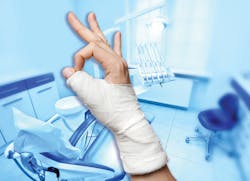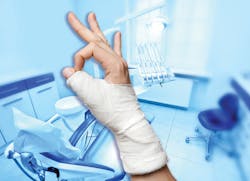Adding insight to injury
Maintaining a positive perspective when clinical practice is placed on hold
By Lauren Hapeman, RDH, BSDH
Clinical dental hygienists are “energizer humans”—we are attentive to thousands of details about our patients, expend great amounts of physical energy on the job, and have many personal responsibilities to address before and after work hours. On the best of days, our patients view us as if we are infallible, and this feeling of invincibility can carry into every aspect of our careers. This feeling typically fuels our passion for quality care, causes us to take pride in our profession, and keeps us coming back to work year after year. That said, we are often unprepared or underprepared for the unthinkable: with a career that both requires manual dexterity and takes a toll on the body, hygienists are simply more likely to experience an unforeseen injury that leaves them out of work for varying amounts of time. This article will address how to maintain optimism and a positive perspective while handling the physical, emotional, and financial consequences of an injury.
The emotional aspect of an injury
A 2014 Gallup poll found that “U.S. workers continue to be more likely to say they get a sense of identity from their job, 55%, as opposed to having their job just be something they do for a living, 42%.”1 This can be especially true for clinical hygienists who form strong, meaningful, and ongoing social relationships with their patients. We come to view patients and coworkers as family, and many of us look forward to going to work.
Losing a role in clinical practice (or similarly, having one’s role placed temporarily on hold) can feel exactly like losing a loved one. It is important to allow yourself time to grieve the loss of a work routine, but it is equally as important not to dwell or feel disempowered by the things that cannot be changed. Whether you will need four to eight weeks or an entire year to heal, give yourself a few days to come to terms with the reality of your recovery, and then commit to a positive outlook. Life is going to be very different, but it is imperative to view this time as an opportunity to grow, seek the support of loved ones, and meditate on the direction of your career. The phrase “trust the process” comes to mind; learn to trust and relinquish control of the situation, as uncomfortable as this feels.
Some suggestions for maintaining a positive outlook while injured can afford hygienists a sense of optimism. This is important, as it helps to prevent depression and gives a continued sense of purpose. The extent to which a person is injured can play a role in what he or she can do during this time out of practice, but there is always (and I mean always) something constructive that can be done.
Returning to work
You’ve made it out of a cast, brace, or bed and through physical therapy. You’ve decided to return to work and your first day back is fast approaching. Now what? There is something to be said for the excitement that you feel when you’re able to see patients and work clinically again. As tempting as it feels to take on a full-time schedule, in the case of the newly recovered, less is more. Be mindful of how it feels to work again and try not to burn yourself out, especially within the first few months after an injury. Resolve to rest whenever you feel fatigued and continue to make healing and strengthening your body a priority. Many hygienists practice part-time by choice, and a temporary or part-time schedule may initially be preferable in order to build endurance and allow for continued recovery.
If you experience a unilateral injury to your hand, arm, or shoulder, brainstorm the ways that you can still get out every day and interact with others. Is there a volunteer or meet-up group that you’ve been meaning to join, a project that you can complete with your opposite hand, or a walking tour that you can plan where you live? Is public transportation conducive to getting out and exploring a new neighborhood? Can you take pictures on a mobile device and create a digital “recovery journal”? Can you sit in on a continuing education course that would have previously conflicted with your schedule? Is there a nearby café that allows patrons to sit and read? These are just a few suggestions for those who still have partial use of their hands and legs.
If you are on bed rest or if you have limited mobility, try incorporating a positive mantra into your morning routine—the way that we choose to spend the first moments after we wake can set the tone for the entire day. Avoid the immediate use of social media, because it promotes comparison to others and can, if used in excess, be counterproductive. Instead, close your eyes, follow your thoughts, and take a few deep breaths. Imagine that you are smelling a flower when you inhale and blowing out a set of birthday candles as you exhale (positive imagery is proven to elevate one’s mood). Create an intention for the day and repeat a positive affirmation (a few favorites are “I breathe in calmness and breathe out nervousness,” “I may not understand the good in this situation, but it is there,” and “This day brings me joy.”2
Now, ask yourself, is there a nearby friend or loved one who can visit regularly or check in via phone? Can you listen to books on tape, set up a reading stand, or use a journal? Is there an area of interest within the profession that you’ve been meaning to explore? Is there a latent talent that you can research or develop? Regardless of the type of injury, goal-oriented hygienists can stay happy during this time by coming up with a list of opportunities and crossing off several items each day.
The financial component
Being injured will mean a reduced income for many. While a discussion for those who are financially underprepared is outside of the scope of this article, it’s important to make the most of this reduction in income and focus on healing. Some can draw on disability benefits when injured on the job, but others will be faced with the prospect of using savings or relying on a loved one for help. It’s daunting to consider the accumulation of medical bills, but it’s also important to realize that these larger expenses can often be negotiated and paid off in feasible installments. Worry does nothing except place even more stress on the body.
If you are planning to return to work within a specific amount of time, budget for the time off and try to get a realistic sense of how much money you can spend per day and whether or not you will need to bring in extra income. Remember that this is an opportunity to be resourceful! Dental hygiene affords so many clinicians with financial stability, and it’s easy to take this for granted. Experiencing a loss of income can induce anxiety but serves no beneficial purpose in the long term.
If you are concerned about supplemental income, try to think of a side job that would bring in extra money. Have you been meaning to declutter your home and list items for sale on the internet? Do you have a talent or skill you could offer by working remotely? Is there a nearby business that could use someone to help with phones or greeting customers? If you absolutely have to work, try to reach out to those you know for immediate opportunities and think outside of the box.
While an injury can feel career ending, hygienists often return to work after they receive clearance from their doctors. Nevertheless, some are either unable to work or, alternately, make a conscious decision to stop practicing in a clinical environment. If you are unsure as to when (or if) you can work again, contemplate your long-term professional goals and whether or not you are in a position to pursue them. If returning to school or changing directions has been on your radar, this may be the perfect opportunity to begin a program or, at least, research options. The benefit to being a dental professional is that many options exist outside of clinical practice. As professionals continue to advocate a four-year degree standard for hygiene programs, hygienists will be primed to access other avenues outside of a traditional operatory. We possess invaluable interpersonal skills and an unmatched attention to detail, making us ideal candidates for other “helping” professions.
Listening to your body
It can be very easy, especially as a hygienist, to rush the healing process. Nobody wants to be told that he or she cannot actively use body parts that worked unfailingly prior to a fracture, sprain, or tear. However, it is extremely important to heed the advice of a doctor and act exclusively within their care plan.
In short, don’t push it! We would all be bothered if a patient picked at a fresh extraction site, applied too much pressure while brushing, or (ahem) disregarded recommendations for interproximal cleaning, thereby resulting in poorer health outcomes. Injured individuals from all walks of life have overextended themselves and ended up needing greater amounts of surgeries, physical therapy sessions, and time off than originally planned. Consider the fact that recovering properly could make or break your ability to practice!
If you are able, move your body by taking long walks, stretching healthy limbs regularly, and complying with all recommendations from a physical therapist. Explore the ways that you can maintain a healthy diet, as you are likely to be more sedentary than usual. Use this time as an opportunity to research and honor your body and marvel at the ways that, with time and patience, it has the ability to return to a healthy equilibrium. Researching new recipes, taking up new low-impact wellness activities (e.g., yoga or meditation), and respecting that injuries require time to heal are all healthy ways to cope with being physically compromised.
Being injured is both a reality and a common occurrence for dental hygienists. The body burns out very quickly when overloaded with strain, and accidents can also occur at random outside of the workplace. When faced with an injury, it is easy (and natural) to become depressed, vulnerable, and disheartened.
However, this is the perfect time to create a space for ourselves and to become more attuned to how we are feeling physically, financially, and emotionally. In doing so, hygienists set themselves up for greater career longevity and can effectively bounce back from their injuries as clinicians who are able to check in with themselves and practice at a pace that is conducive to maintaining optimal health.
Lauren Hapeman, RDH, BSDH, is a clinical dental hygienist in Philadelphia, Pennsylvania. She is interested in public health and periodontics and is currently working toward a master’s degree in dental hygiene. She lives with an adorable American bulldog mix named Ralphie and welcomes new connections with dental professionals. You can reach her at [email protected].
References
1. Riffkin R. In U.S., 55% of workers get sense of identity from their job. http://news.gallup.com/poll/175400/workers-sense-identity-job.aspx. Published August 22, 2014.
2. The only 100 positive affirmations you will ever need. Prolific Living website. https://www.prolificliving.com/100-positive-affirmations/.

